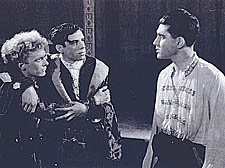| |

Harold Pinter as as Romeo (right), with Ron Percival as Benvolio and Barry Supple as Mercutio. Photo courtesy of Binnie Yeates, who played Juliet in this 1948 school production |
Reading between Pinter’s lines
Collection of notes provide rare insight into playwright’s life at library exhibition
PRAISE and criticism for playwright Harold Pinter is preserved with equal care in his extensive archives, which he has sold to the British Library for £1.1 million.
A selection of 11,000 letters and emails and 100 boxes of drafts of screenplays and poems dating back to 1947 are currently on display in the library’s Sir John Ritblat Gallery.
Sketchings of the Hackney of his youth sit alongside photographs of him taking the leading role in his secondary school’s production of Shakespeare’s Romeo and Juliet in 1948 (pictured).
Pinter, the son of a Jewish dressmaker became renowned for productions such as The Homecoming (1964), Betrayal (1978) and The Caretaker (1960), which explore the power-play between characters trapped in depressing circumstances.
Pinter’s battle with establishment hierarchy is evident in documents from the Lord Chamberlain’s Office, the now defunct stage censors.
In correspondence Samuel Beckett, a life-long inspiration to Pinter, gives his “warmest congratulations” for Betrayal in spidery italic handwriting, describing the closing scene as “a curtain of curtains”.
Handwritten drafts of poetry and scripts reveal how Pinter’s literary contributions come into existence, starting with a few lines using unpredictable dialogue and pregnant pauses marked with a “p”.
Pinter’s abrasive engagement with every aspect of theatre is revealed in a letter to American dramatist David Mamet – author of Oleanna, a play about a university professor and a female student who accuses him of rape – insisting that with Pinter as director only the original, abandoned ending would do.
Pinter wrote in 1993: “I have always thought and still do think it’s a f***ing marvellous ending.”
Mamet replied by fax: “Go ahead and rehearse the sodding thing – you flatterer.”
A slightly battered scrapbook, haphazardly restored with silver masking tape, documents the reviews of his plays, from his lauded The Room, first performed in a disused squash court at Bristol University in 1957, to The Birthday Party, which was sneered at in the national press but extolled locally.
Jamie Andrews, head of modern literary manuscripts at the British Library, who ordered the exhibition around Pinter’s Nobel speech in 2005, said: “He didn’t burn the bad reviews and keep the good ones.
“He was aware of the importance of his material and that he was keeping a comprehensive record of everything.”
|
 |
| |
|
|


